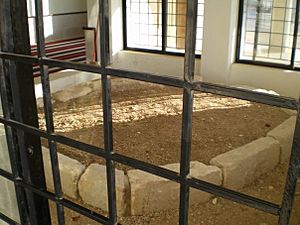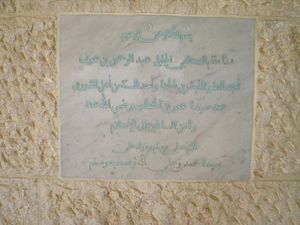Abd al-Rahman ibn Awf facts for kids
Quick facts for kids ʿAbd al-Raḥmān ibn ʿAwfعبد الرحمن بن عوف |
|
|---|---|
| Religion | Islam |
| Known for | being a companion of Muhammad; one of the ten to whom Paradise was promised |
| Personal | |
| Born | c. 581 Mecca, Hejaz, Arabia |
| Died | c. 654 (aged 72–73) Medina, Rashidun Caliphate |
| Resting place | al-baqi, Medina |
| Spouse |
|
| Children | See #Family tree |
| Parents |
|
| Relations | Banu Zuhrah (clan) |
ʿAbd al-Raḥmān ibn ʿAwf (born ʿAbd ʿAmr ibn ʿAwf, around 581 CE – died 654 CE) was a very important person in early Islam. He was one of the closest friends and followers of the Prophet Muhammad. People knew him as one of the wealthiest companions. He is also famous for being one of "the ten to whom Paradise was promised."
Abd al-Raḥmān ibn ʿAwf was highly respected. He played a big part in the early history of Islam.
He was born in Mecca around 580 CE. His family belonged to the Banū Zuhrah clan of the Quraysh tribe. His first name was ʿAbd ʿAmr. Later, the Prophet Muhammad renamed him ʿAbd al-Raḥmān, which means "Servant of the Most Merciful." He became a Muslim very early, even before many others.
Because of his new faith, he faced difficulties in Mecca. He had to move twice to find safety. First, he went to Abyssinia (modern-day Ethiopia). Then, he moved to Medina in an important journey called the Hijrah.
When he arrived in Medina, he had no money. The Prophet Muhammad paired him with Saʿd ibn Rabīʿ as a brother in Islam. Saʿd offered to share half of his wealth. But ʿAbd al-Raḥmān politely said no. He only asked to be shown the marketplace. Through hard work and honesty, he became very rich. Even with his wealth, he stayed humble and generous.
He took part in many important events, including:
- The Battle of Badr
- The Battle of Uhud
- The Battle of the Trench
- Other campaigns with the Prophet Muhammad
He was known for his great generosity. He often gave away large amounts of goods, gold, and food to help others. He is one of the ten companions promised a place in Paradise.
After the Prophet Muhammad passed away, ʿAbd al-Raḥmān had a key role. He helped choose ʿUthmān ibn ʿAffān as the third leader (caliph) of the Muslim community. This showed his wisdom and trustworthiness.
ʿAbd al-Raḥmān ibn ʿAwf died around 652 CE. He was buried in the al-Baqīʿ cemetery in Medina.
Contents
Early Life and Faith
Abu Bakr, another close companion, introduced Abd al-Rahman to Islam. He then met Prophet Muhammad and declared his faith. This happened very early in Islam. Abd al-Rahman was among the first eight men to accept Islam.
Around 614 CE, the non-Muslim leaders in Mecca began to oppose those who followed Prophet Muhammad. They often threatened Muslim merchants, saying they would stop buying their goods.
Abd al-Rahman was part of a group of fifteen Muslims who moved to Abyssinia in 615 CE. They found safety there and could practice their faith without fear. Later, they heard a false report that the Meccans had accepted Islam. Abd al-Rahman returned to Mecca, finding protection from a local citizen.
Life in Medina
When Abd al-Rahman moved to Medina, he had a friend named Umayyah ibn Khalaf. Umayyah was against Islam. They made an agreement: Abd al-Rahman would protect Umayyah's family in Medina, and Umayyah would protect Abd al-Rahman's in Mecca.
The two met again during the Battle of Badr in March 624 CE. Sadly, Umayyah ibn Khalaf was killed in the battle.
Abd al-Rahman was one of the few who stayed with Prophet Muhammad during the Battle of Uhud. Many other warriors had left the battlefield. He also took part in the Pledge of the Tree during the first pilgrimage of the Medinan Muslims. Abd al-Rahman participated in all military actions led by Prophet Muhammad.
Important Missions
In August 626 CE, Prophet Muhammad sent Abd al-Rahman ibn Awf on a mission. He was to lead a group to the Kalb tribe in Daumatul-Jandal. Prophet Muhammad gave him instructions to fight fairly and protect children. He also taught him how to wear a turban.
Abd al-Rahman succeeded in his mission. The Kalb tribe agreed to become Muslim and pay a tax. To strengthen this new alliance, Abd al-Rahman married Tamadur bint Al-Asbagh, the chief's daughter. He brought her back to Medina.
Leadership Roles
In August 634 CE, the first caliph, Abu Bakr, was nearing his death. He chose Umar ibn al-Khattab as his successor. Abd al-Rahman and Uthman were there to hear this important decision.
Abd al-Rahman ibn Awf was present at the Battle of al-Qadisiyyah in 635 CE. This battle was a major victory for the Muslim armies. They then moved on to conquer Ctesiphon, the capital of the Sasanian Empire. Later, Abd al-Rahman also took part in the Battle of Jalula in 637 CE. The Muslims gained many valuable items from this battle. Abd al-Rahman and Abdullah ibn Arqam were chosen to take these items to the capital.
After the conquest of Jerusalem, Abd al-Rahman helped write the 'covenant of Umar'. This document outlined the rules for the newly conquered city. During Umar's time as caliph, Abd al-Rahman focused on religious studies. He also led the group of pilgrims for the Hajj.
In 644 CE, the dying caliph Umar chose a council of six members. This council, called the Council of Shura, would elect the next caliph. The members included Abd al-Rahman ibn Awf, Ali ibn Abi Talib, and Uthman ibn Affan. Abd al-Rahman ibn Awf played a key role in choosing Uthman as the third caliph.
Death
Abd al-Rahman passed away in Medina in 653 or 654 CE. He was about 72 years old. He was buried in Al-Baqi cemetery.
Personal Life
Abd al-Rahman ibn Awf was famous for his great wealth. He was also known as a very smart businessman. After moving to Medina with nothing, he started a business selling clarified cheese and butter. This business, along with land given to him by Prophet Muhammad, made him very successful.
People said he had many horses, camels, and sheep. These animals grazed on land in Al-Baqi. His camels also helped farm the land, allowing his family to grow crops. Because he participated in all of Prophet Muhammad's battles, his wealth grew from the spoils of war. When he died, he left a huge inheritance.
There's a story about his success, sometimes called his "Midas touch." When asked about his secret, Abd al-Rahman said he never picked up a stone without expecting to find gold or silver underneath it. He had a large family with many children.
Family tree
| Abd al-Rahman ibn Awf family tree. relationship between Banu Zuhrah and Banu Hashim | |||||||||||||||||||||||||||||||||||||||||||||||||||||||||||||||||||||||||||||||||||||||||||||||||||||||||||||||||||||||||||||||||||||||||||||||||||||||||||||||||||||||||||||||||||||||||||||||||||||||||||||||||||||||||||||||||||||||||||||||||||||||||||||||||||||||||||||||||||||||||||||||||||||||||||||||||||||||||||||||||||||||||||||||||||||||||||||||||||||||||||||||||||||||||||||||||||||||||||||||||||||||||||||||||||||||||||||||||||||||||||||||||||||||||||||||||||||||||||||||||||||||||||||||||||||||||||||||||||||||||||||||||||||||||||||||||||||||||||||||||||||||||||||||||||||||||||||||||||||||||||||||||||||||||||||||||||||||||||||||||||||||||||||||||||||||||||||||||||||||||||||||||||||||||||||||||||||||||||||||||||||||||||||||||||||||||||||||||||||||||||||||||||||||||||||||||||||||||||||||||||||||||||||||||||||||||||||||||||||||||||||||||||||||||||||||||||||||||||||||||||||||||||||||||||||||||||||||||||||||||||||||||||||||||||||||||||||||||||||||||||||||||||||||||||||||||||||||||||||||
|---|---|---|---|---|---|---|---|---|---|---|---|---|---|---|---|---|---|---|---|---|---|---|---|---|---|---|---|---|---|---|---|---|---|---|---|---|---|---|---|---|---|---|---|---|---|---|---|---|---|---|---|---|---|---|---|---|---|---|---|---|---|---|---|---|---|---|---|---|---|---|---|---|---|---|---|---|---|---|---|---|---|---|---|---|---|---|---|---|---|---|---|---|---|---|---|---|---|---|---|---|---|---|---|---|---|---|---|---|---|---|---|---|---|---|---|---|---|---|---|---|---|---|---|---|---|---|---|---|---|---|---|---|---|---|---|---|---|---|---|---|---|---|---|---|---|---|---|---|---|---|---|---|---|---|---|---|---|---|---|---|---|---|---|---|---|---|---|---|---|---|---|---|---|---|---|---|---|---|---|---|---|---|---|---|---|---|---|---|---|---|---|---|---|---|---|---|---|---|---|---|---|---|---|---|---|---|---|---|---|---|---|---|---|---|---|---|---|---|---|---|---|---|---|---|---|---|---|---|---|---|---|---|---|---|---|---|---|---|---|---|---|---|---|---|---|---|---|---|---|---|---|---|---|---|---|---|---|---|---|---|---|---|---|---|---|---|---|---|---|---|---|---|---|---|---|---|---|---|---|---|---|---|---|---|---|---|---|---|---|---|---|---|---|---|---|---|---|---|---|---|---|---|---|---|---|---|---|---|---|---|---|---|---|---|---|---|---|---|---|---|---|---|---|---|---|---|---|---|---|---|---|---|---|---|---|---|---|---|---|---|---|---|---|---|---|---|---|---|---|---|---|---|---|---|---|---|---|---|---|---|---|---|---|---|---|---|---|---|---|---|---|---|---|---|---|---|---|---|---|---|---|---|---|---|---|---|---|---|---|---|---|---|---|---|---|---|---|---|---|---|---|---|---|---|---|---|---|---|---|---|---|---|---|---|---|---|---|---|---|---|---|---|---|---|---|---|---|---|---|---|---|---|---|---|---|---|---|---|---|---|---|---|---|---|---|---|---|---|---|---|---|---|---|---|---|---|---|---|---|---|---|---|---|---|---|---|---|---|---|---|---|---|---|---|---|---|---|---|---|---|---|---|---|---|---|---|---|---|---|---|---|---|---|---|---|---|---|---|---|---|---|---|---|---|---|---|---|---|---|---|---|---|---|---|---|---|---|---|---|---|---|---|---|---|---|---|---|---|---|---|---|---|---|---|---|---|---|---|---|---|---|---|---|---|---|---|---|---|---|---|---|---|---|---|---|---|---|---|---|---|---|---|---|---|---|---|---|---|---|---|---|---|---|---|---|---|---|---|---|---|---|---|---|---|---|---|---|---|---|---|---|---|---|---|---|---|---|---|---|---|---|---|---|---|---|---|---|---|---|---|---|---|---|---|---|---|---|---|---|---|---|---|---|---|---|---|---|---|---|---|---|---|---|---|---|---|---|---|---|---|---|---|---|---|---|---|---|---|---|---|---|---|---|---|---|---|---|---|---|---|---|---|---|---|---|---|---|---|---|---|---|---|---|---|---|---|---|---|---|---|---|---|---|---|---|---|---|---|---|---|---|---|---|---|---|---|---|---|---|---|---|---|---|---|---|---|---|---|---|---|---|---|---|---|---|---|---|---|---|---|---|---|---|---|---|---|---|---|---|---|---|---|---|---|---|---|---|---|---|---|---|---|---|---|---|---|---|---|---|---|---|---|---|---|---|---|---|---|---|---|---|---|---|---|---|---|---|---|---|---|---|---|---|---|---|---|---|---|---|---|---|---|---|---|---|---|---|---|---|---|---|---|---|---|---|---|---|---|---|---|---|---|---|---|---|---|---|---|---|---|---|---|---|---|---|---|---|---|---|---|---|---|---|---|---|---|---|---|---|---|---|---|---|---|---|---|---|---|---|---|---|---|---|---|---|---|---|---|---|---|---|---|---|---|---|---|---|---|---|---|---|---|---|---|---|---|---|---|---|---|---|---|---|---|---|---|---|---|---|---|---|---|---|---|---|---|---|---|---|---|---|---|---|---|---|---|---|---|---|---|---|---|---|---|---|---|---|---|---|---|---|---|---|---|---|---|---|---|---|---|---|---|---|---|---|---|---|---|---|---|---|---|---|---|---|---|---|---|---|---|---|---|---|---|---|---|---|---|---|---|---|---|---|---|---|---|---|---|---|---|---|---|---|---|---|---|---|---|---|---|---|---|---|---|---|---|---|---|---|---|---|---|---|---|---|---|---|---|---|---|---|---|---|---|---|---|---|---|---|
|
|||||||||||||||||||||||||||||||||||||||||||||||||||||||||||||||||||||||||||||||||||||||||||||||||||||||||||||||||||||||||||||||||||||||||||||||||||||||||||||||||||||||||||||||||||||||||||||||||||||||||||||||||||||||||||||||||||||||||||||||||||||||||||||||||||||||||||||||||||||||||||||||||||||||||||||||||||||||||||||||||||||||||||||||||||||||||||||||||||||||||||||||||||||||||||||||||||||||||||||||||||||||||||||||||||||||||||||||||||||||||||||||||||||||||||||||||||||||||||||||||||||||||||||||||||||||||||||||||||||||||||||||||||||||||||||||||||||||||||||||||||||||||||||||||||||||||||||||||||||||||||||||||||||||||||||||||||||||||||||||||||||||||||||||||||||||||||||||||||||||||||||||||||||||||||||||||||||||||||||||||||||||||||||||||||||||||||||||||||||||||||||||||||||||||||||||||||||||||||||||||||||||||||||||||||||||||||||||||||||||||||||||||||||||||||||||||||||||||||||||||||||||||||||||||||||||||||||||||||||||||||||||||||||||||||||||||||||||||||||||||||||||||||||||||||||||||||||||||||||||
His sister was married to Bilal Ibn Rabah.
He married at least sixteen times and had at least thirty children.
- Umm Habiba bint Zama'a, a sister of Sawda. No children are known from this marriage.
- Umm Kulthum bint Utba of the Abdshams clan of the Quraysh in Mecca.
- Salim the Elder (died before Islam).
- The Daughter of Shayba ibn Rabia ibn Abdshams.
- Umm Al-Qasim (born before Islam).
- Habiba bint Jahsh of the Asad tribe, a sister of Zaynab bint Jahsh (childless).
- Tamadir bint al-Asbagh of the Kalb tribe. Although Abd al-Rahman divorced her during his final illness, she, like his other three widows, inherited one-thirty-second of his fortune, which was 80,000 or 100,000 dirhams.
- Abdullah the Younger (Abu Salama).
- Umm Kulthum bint Uqba from the Umayya clan of the Quraysh in Mecca.
- Muhammad, from whom he took his kunya of Abu Muhammad.
- Ibrahim.
- Humayd.
- Isma'il.
- Hamida.
- Amat ar-Rahman the Elder.
- Sahla bint Asim from the Baliyy tribe of Medina.
- Maan.
- Umar.
- Zayd.
- Amat ar-Rahman the Younger.
- Bahriya bint Hani of the Shayban tribe.
- Urwa the Elder (killed at Ifriqiya).
- Sahla bint Suhayl of the Amir ibn Luayy clan of the Quraysh.
- Salim the Younger (killed at Ifriqiya).
- Umm Hakim bint Qariz of the Kinana tribe.
- Abu Bakr.
- The Daughter of Abu al-His ibn Rafi from the Abdulashhal ibn Aws tribe of Medina.
- Abdullah (killed during the conquest of Africa)
- Asma bint Salama
- Abd al-Rahman.
- Umm Horayth, a war-captive from Bahra
- Mus'ab.
- Amina.
- Maryam.
- Majd bint Yazid from the Himyar tribe.
- Suhyal (Abu'l-Abayd)
- Zaynab bint As-Sabbah.
- Umm Yahya.
- Badiya bint Ghaylan from the Thaqif tribe.
- Juwayriya.
- Ghazzal bint Khosrau (concubine), a war-captive from Al-Mada'in
- Uthman
- Other Concubines (unnamed).
- Urwa.
- Yahya.
- Bilal.
- Saad.
- al-Miswar (died at al-Harra).
- Fakhita, a wife of Yazid ibn Abi Sufyan.
- Umm al-Qasim the Younger, a wife of Yahya ibn al-Hakam (brother of Marwan I).
- Daughter, a wife of Abdullah ibn Uthman ibn Affan.
- Daughter, a wife of Abdullah ibn Abbas.
Philanthropy
Many stories show Abd al-Rahman's personal generosity. He once provided Prophet Muhammad's army with 1,500 camels. He also left money for the survivors of the Battle of Badr. He gave a large gift to the widows of Prophet Muhammad.
A scholar named Dhahabi reported a story about Abd al-Rahman. He brought a caravan of about 700 merchant-camels into Medina. Aisha, Prophet Muhammad's wife, said she heard the Prophet say: "I have seen Abd al-Rahman ibn Awf entering Paradise crawling." When Abd al-Rahman heard this, he replied: "If I could, I would certainly like to enter Paradise standing. I swear to you, that this entire caravan with all its merchandise, I will give in charity." And he did exactly that.
Abd al-Rahman also reportedly gave 50,000 gold dinars from his own money to charity.
Sunni View
Sunni Muslims consider him one of al-ʿashara al-mubashsharūn. These are the ten companions whom Prophet Muhammad said would enter Paradise.
Fun Facts About Abd al-Rahman ibn 'Awf
- His original name was ʿAbd ʿAmr, but Prophet Muhammad renamed him ʿAbd al-Raḥmān, meaning "Servant of the Most Merciful."
- He was one of the first eight men to accept Islam, even before Muslims gathered secretly at al-Arqam’s house.
- Abd al-Rahman ibn 'Awf arrived in Medina with nothing but built an enormous fortune through honest hard work and smart business, refusing charity even when offered.
- He was so successful in business that people joked he had a "Midas touch," meaning everything he invested in seemed to prosper.
- Abd al-Rahman ibn 'Awf is one of the ten companions of Prophet Muhammad who were specifically promised Paradise.
- At his death, his inheritance was so vast that a quarter of it alone was worth 84,000 Dinars (gold coins)!
See also
- Companions of the Prophet
- The ten to whom Paradise was promised
- List of expeditions of Muhammad
- Banu Kalb
 | Frances Mary Albrier |
 | Whitney Young |
 | Muhammad Ali |



